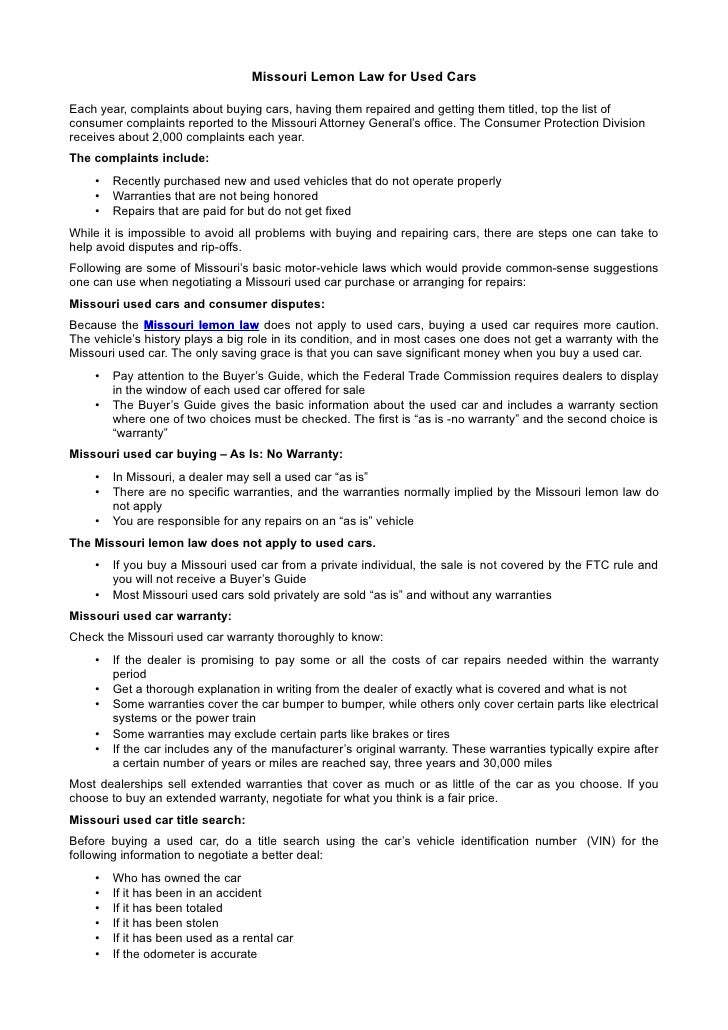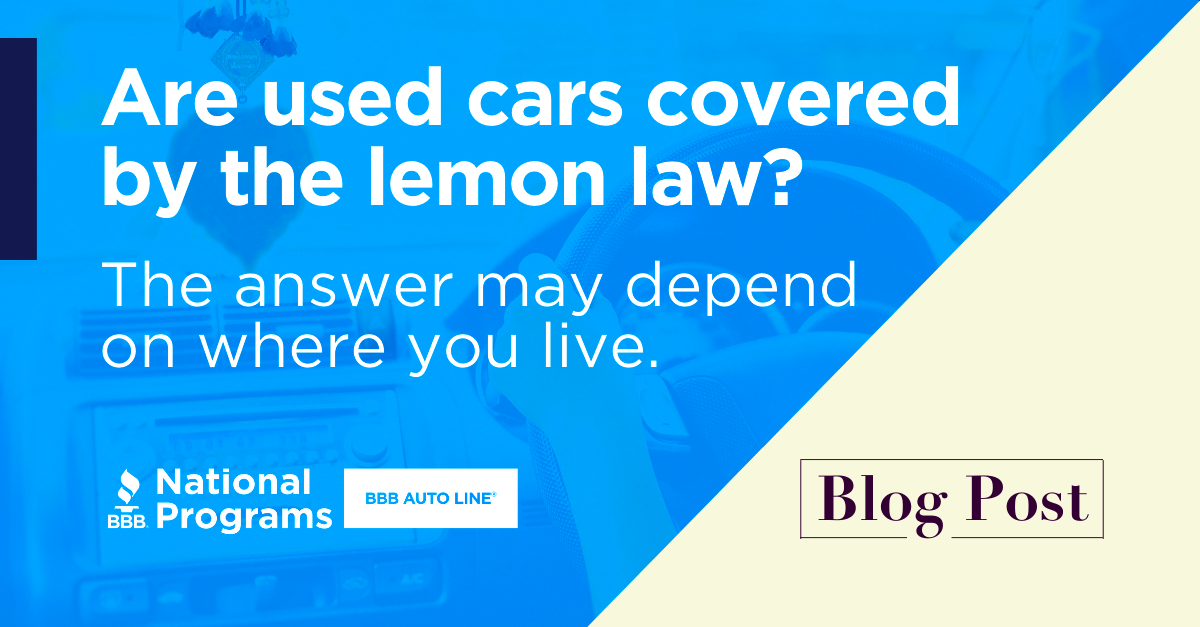Missouri Lemon Law for Used Cars and Your Rights
The Lemon Law in Missouri protects consumers who purchase defective vehicles. It’s designed to provide relief when you buy a car that has serious issues that the dealer cannot fix after a reasonable number of attempts. This law ensures that you, as a buyer, are not stuck with a lemon—a term used to describe a vehicle that is subpar due to manufacturing defects.
Knowing your rights can make a significant difference in your experience as a car buyer. The Lemon Law applies specifically to new vehicles, but there are also protections for used cars in certain circumstances. Understanding the nuances of the law can help you determine if you are eligible for protection and what steps you need to take if you encounter issues with your vehicle.
Who Qualifies for Lemon Law Protection

In Missouri, the Lemon Law primarily applies to new vehicles, but there are specific criteria that must be met for you to qualify for protection:
- New Vehicles: The law generally covers cars, trucks, and motorcycles that are less than one year old or have fewer than 12,000 miles.
- Serious Defects: The issues with the vehicle must significantly impair its use, safety, or value. This can include problems with the engine, transmission, or brakes.
- Repair Attempts: You must give the manufacturer or dealer a reasonable number of attempts to fix the defect. In Missouri, this is usually defined as four attempts for the same issue.
- Timeframe: The defect must occur within the warranty period or within one year from the date of purchase.
If your vehicle meets these criteria, you may be eligible for remedies such as a refund or replacement vehicle. Always keep detailed records of your repairs and communications with the dealer to support your claim.
Key Provisions of Missouri Lemon Law

The Missouri Lemon Law includes several key provisions designed to protect consumers. Here’s what you should know:
- Definition of a Lemon: A vehicle that has substantial defects that impair its safety, use, or value.
- Warranty Requirement: The vehicle must be covered by a warranty, whether it’s a manufacturer’s warranty or an extended warranty.
- Reasonable Number of Repairs: As mentioned, you must give the dealer or manufacturer a chance to fix the issue. If they fail, you can proceed with a claim.
- Claim Process: If the dealer is unable to fix the problem after a reasonable number of attempts, you can file a claim for a refund or a replacement vehicle.
- Consumer Rights: The law empowers consumers by ensuring they can recover their investment if they buy a defective vehicle.
By understanding these provisions, you can navigate the Lemon Law process more effectively and know your rights as a consumer.
Steps to Take if You Suspect a Lemon

Finding out that your vehicle might be a lemon can be frustrating and stressful. However, there are specific steps you can take to address the situation effectively. Here’s a guide to help you navigate through the process:
- Document Everything: Keep a detailed record of all repairs and issues with your vehicle. Note down dates, mileage, and the nature of each problem. This documentation will be crucial for your claim.
- Communicate with the Dealer: Inform the dealer about the ongoing issues. Give them a chance to fix the problem. Ensure you get any agreements or repair orders in writing.
- Know the Warranty: Familiarize yourself with your vehicle’s warranty terms. This will help you understand what is covered and what steps to take next.
- Consult an Expert: Consider talking to a Lemon Law attorney. They can provide valuable insights and help assess your situation based on the law.
- Be Persistent: If the dealer fails to resolve the issue, follow up regularly. Don’t hesitate to escalate the matter if necessary.
By following these steps, you can strengthen your case and ensure that your rights as a consumer are protected.
How to File a Lemon Law Claim

Once you’ve determined that your vehicle qualifies as a lemon, it’s time to file a claim. Here’s how you can do it:
- Prepare Your Documentation: Gather all your records, including repair invoices, correspondence with the dealer, and your vehicle’s warranty details.
- Write a Demand Letter: Draft a letter addressed to the manufacturer or dealer, detailing your situation. Include copies of your documentation and clearly state your request for a refund or replacement.
- Send the Letter: Use certified mail to send your demand letter. This provides proof of delivery and ensures the recipient acknowledges your claim.
- Wait for a Response: The manufacturer typically has a specific time frame to respond. Be patient but keep track of the timeline.
- Seek Legal Help: If you don’t receive a satisfactory response or resolution, consider consulting a Lemon Law attorney. They can help you navigate the legal process.
Filing a claim can feel daunting, but staying organized and persistent can help you achieve a successful outcome.
Possible Outcomes of a Lemon Law Claim
When you file a Lemon Law claim, you may be wondering what the potential outcomes could be. Here are the most common results you might expect:
- Refund: If your claim is successful, you could receive a full refund of the purchase price, including taxes, fees, and any additional expenses incurred due to the defect.
- Replacement Vehicle: Instead of a refund, you might be offered a replacement vehicle that is free from defects.
- Repairs: In some cases, the manufacturer may agree to fix the vehicle, although this option is less common if you’ve already pursued a claim.
- Settlement: Often, manufacturers may prefer to settle out of court. This could involve a financial compensation that might not be a full refund but still provides relief.
- No Resolution: If the claim is denied, you still have the option to pursue further legal action. Consulting an attorney can help you understand your next steps.
Understanding these outcomes can help you set realistic expectations and prepare for what may come next in your Lemon Law journey.
Common Misconceptions about Lemon Law
Lemon laws can be a bit confusing, and there are several misconceptions that often mislead consumers. It’s essential to separate fact from fiction to better understand your rights. Here are some common myths:
- Lemon Laws Only Apply to New Cars: Many believe lemon laws only cover new vehicles, but Missouri has provisions for used cars under certain conditions. If a used vehicle has serious defects and has been repaired multiple times, it may qualify.
- Any Defect Makes a Car a Lemon: Not every defect qualifies under the lemon law. The issues must significantly impair the vehicle’s use, safety, or value. Minor problems or cosmetic issues typically do not qualify.
- You Must Sue the Dealer: Some think that filing a claim means automatically suing the dealer. In most cases, you can resolve your claim without litigation through negotiation or mediation.
- All Lemon Law Claims Are Successful: While many claims are successful, not all will result in a refund or replacement. Each case depends on its unique circumstances, documentation, and the manufacturer’s response.
- Once a Claim is Filed, You Can’t Drive the Car: Filing a claim does not mean you must stop using your vehicle. However, it’s best to keep track of any ongoing issues while your claim is being processed.
Understanding these misconceptions helps you navigate the lemon law process with confidence and clarity.
Additional Consumer Protections in Missouri
In addition to the Lemon Law, Missouri offers several other consumer protections that can benefit car buyers. Here are some important ones:
- Missouri Merchandising Practices Act: This law protects consumers from unfair practices in sales, advertising, and warranties. It allows you to take action against deceptive practices.
- Vehicle Warranty Laws: Missouri requires that all vehicles come with a written warranty. This warranty must outline the coverage details, ensuring you know your rights if something goes wrong.
- Used Car Warranty Law: If you buy a used car, the dealer must provide a warranty if the vehicle is sold “as is.” This protects consumers from undisclosed defects.
- Right to Rescind: In some situations, consumers have the right to rescind a sale, especially if there was fraud or misrepresentation involved.
- Rebuttable Presumption: Under Missouri law, if a defect occurs within the warranty period, there is a presumption that the manufacturer or dealer is responsible, which can strengthen your claim.
By being aware of these additional protections, you can better advocate for yourself when dealing with car purchases and potential defects.
FAQ
Here are some frequently asked questions regarding Lemon Law and consumer protections in Missouri:
- What is the Lemon Law? The Lemon Law is designed to protect consumers who purchase defective vehicles that cannot be repaired after a reasonable number of attempts.
- How do I know if my car qualifies as a lemon? If your vehicle has significant defects that impair its use, safety, or value, and the dealer cannot fix it after a reasonable number of attempts, it may qualify.
- Do I need a lawyer to file a Lemon Law claim? While it’s not mandatory, having a lawyer can help you navigate the process and strengthen your claim.
- What should I do if my claim is denied? You can seek legal advice to explore your options, which may include filing a lawsuit or negotiating a settlement.
- How long do I have to file a claim? In Missouri, you typically have a time limit of up to one year from the date of the first repair attempt to file a claim under the Lemon Law.
These FAQs can provide further clarity on your rights and the Lemon Law process, helping you make informed decisions.
Conclusion
Navigating the complexities of Lemon Law and understanding your rights as a consumer can be daunting. However, by familiarizing yourself with the provisions of the Missouri Lemon Law, recognizing common misconceptions, and knowing the steps to take if you suspect your vehicle is a lemon, you empower yourself to make informed decisions. Remember, keeping thorough documentation, communicating effectively with dealers, and seeking legal advice when necessary are crucial steps in protecting your interests. Whether you seek a refund, a replacement, or a settlement, understanding the law will guide you through the process and help you achieve a favorable outcome. Don’t hesitate to stand up for your rights; after all, you deserve a vehicle that meets your expectations and performs reliably.


